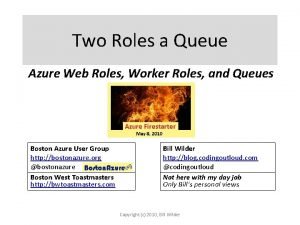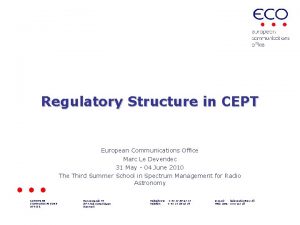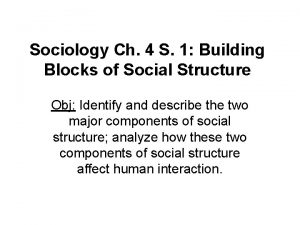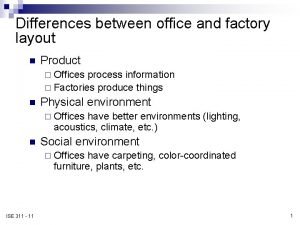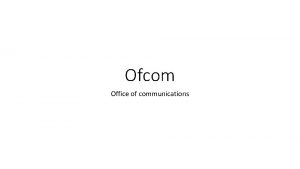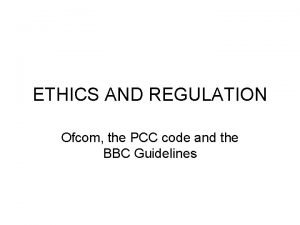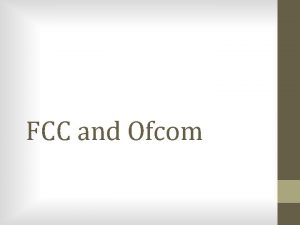Ofcom Role and Purpose The Office of Communications







- Slides: 7

Ofcom

Role and Purpose The Office of Communications, more commonly known as, and referred to as Ofcom. They are the regulatory and competition authority for the broadcasting, telecommunications and postal industries of the United Kingdom. They have a wide range of power across the media aspects they cover, with this power needed as they have the duty to represent the interests of citizens and consumers by promoting competition and protecting the public from harmful or offensive material. Other areas they focus on would be dealing with licensing, research, codes and policies, complaints, competition and protecting the radio spectrum from abuse (for example, ‘pirate’ radio stations).

Legal Powers Legal Power – (law) the right and power to interpret and apply the law. In their position, the Office of Communications is the United Kingdom approved regulatory of communication aspects in media. Due to the approval from the government of the UK, they have full power over what is allowed and what is rejected.

Media Aspects Covered The Office of Communications cover the media aspects of television, radio, telephones, broadband, electromagnetic spectrum licensing, the postal services and consultations with the industries and the public. For television and radio, they license out all of them in the United Kingdom. Broadcasters of television and radio must comply by the terms of the license they give or have the risk of getting it entirely revoked. With this, they also publish the ‘Broadcasting Code’, in which is a series of rules that television and radio must follow, which include rulings of appropriate and inappropriate content for children and times of broadcasting, alongside BBFC certificate films with high age ratings on TV needing a PIN-protected system in place to view the content. This is only some of what power Ofcom have.

Case Study In 2008, the Office of Communications went for the British Broadcasting Corporation (BBC) after a case where the broadcasting service was caught deceiving their viewers, in which then Ofcom fined the BBC £ 400, one of the largest fines the service had ever received. The reason behind the fine, was due to an investigation where the BBC were deceiving their viewers in regards to phone-in competitions on both television and over the radio, on their flagship programmes for the medias. The television programmes included Comic Relief, Sport Relief, and Children in Need, with the radio shows including The Jo Whiley Show on BBC Radio 1 and Russel Brand on BBC Radio 6. In every case Ofcom investigated, it was found that the ‘lucky winners’ that were ‘viewers’ were, instead, made up names of winners or production staff posing as contestants. It was also in the same investigation that the production team, in some cases, encouraged viewers/listeners to enter the competitions, despite the ones who’d entered having a 0% chance of winning. When asked, a regulator at Ofcom said "Ofcom considered that these breaches of the code were very serious. In each of these cases the BBC deceived its audience by faking winners of competitions and deliberately conducting competitions unfairly. Overall, Ofcom found that the BBC failed to have adequate management oversight of its compliance and training procedures to ensure that the audiences were not misled. "

Controversies With Ofcom and controversies, its more-so them dealing with complaints of aspects in media that appear controversial, with sometimes full investigations launched or not taking the investigation further. For an interesting case in 2017, complaints were sent to Ofcom about an episode of Coronation Street that aired on July 31 st. The episode in question featured two parents trying to get their baby to bed and sleep, but after multiple bouts of being tired, the pair attempted ‘controlled crying’. ‘Controlled Crying’ is a technique where you train a baby to stop relying on the comfort their parents by their side in order to sleep, learning to soothe themselves to sleep, which eventually makes the baby more independent with their sleeping habits. The scene ended with the pair leaving the baby upstairs, with the sounds of screaming as the scene ends. The ending of the scene prompted viewers to send the complaints off to Ofcom. When it came to addressing the complaints, a spokesman from Ofcom said that they would not be launching an investigation on the episode in question. "We considered complaints that this episode promoted 'controlled crying', a parenting method which attracts strong views. We found the plot centred around the relationship between two characters, and did not promote a view on whether controlled crying is appropriate or effective. "

Impact on the Production of a Media Product With the inclusion of codes to follow and understand, alongside involvement with the UK Government, the media services need to be extra careful with what they do and how its done, with slight or major slip-ups possibly leading to paying large fines to fix for the mistakes, which even then could be detrimental to their reputation and company/service as a whole.

